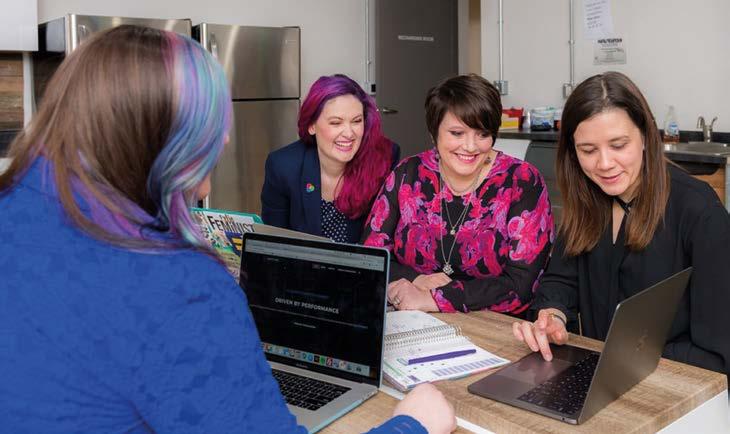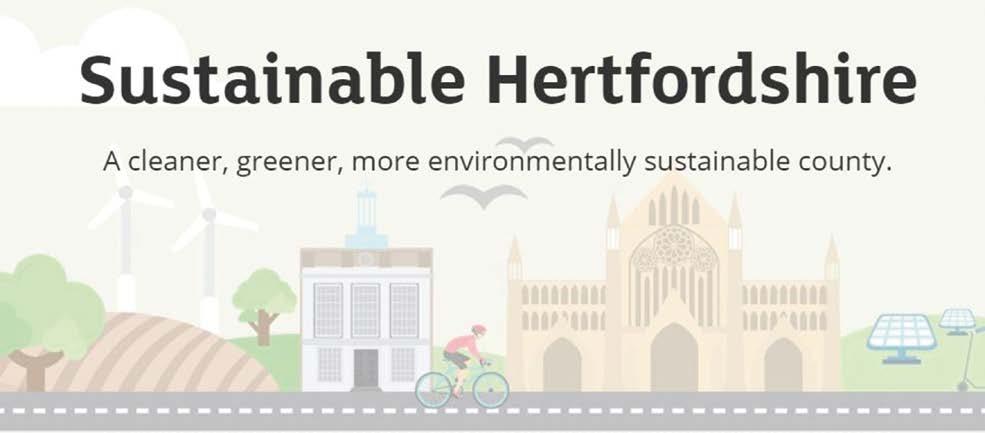
36 minute read
TOURISM & HOSPITALITY
Tourism fights back
The COVID-19 pandemic has hit the business community hard but the tourism sector has suffered more than most. Multiple lockdowns have forced the temporary closure of many of Hertfordshire’s star venues and attractions, and even when they were able to reopen again last summer, strict social distancing measures meant that trade wasn’t as buoyant as usual.
Now, though, the tourism sector is fighting back. The successful COVID vaccination programme has given everybody hope that the pandemic will come to an end soon, and tourism firms are preparing to open their doors again in a phased way in line with the government’s roadmap out of lockdown.
That said, they face several challenges as they begin to welcome customers back. Social distancing measures are likely to remain in place for some time, and the big question is whether people will be confident enough to return to busy venues – especially those who haven’t yet received their vaccine. Here we profile some of Hertfordshire’s tourism businesses and ask them about the challenges ahead and their hopes for a brighter future…
Paradise Wildlife Park (PWP)
It has been a challenging year for Paradise Wildlife Park (PWP). In spring last year, with the pandemic spreading through the UK like wildfire, the park was forced to close its doors and although it reopened in the summer, a further surge in COVID cases in the autumn brought two subsequent lockdowns.
Now, however, brighter skies are emerging on the horizon. PWP was able to reopen on April 12 and its management team is planning for a much busier summer. Anna Tank, public relations manager at PWP, says: “We were actually a little disappointed with the government’s roadmap out of lockdown because we wanted to be open for Easter. That wasn’t possible, but we’re looking forward to opening our new Jaguar Jungle in May. This will be three times the size of the original jungle and will have a new show house, upstairs viewing areas, and a new pool with underwater viewing – bringing visitors closer to our jaguars than ever before. “Later in the summer we’ll be opening our ground-breaking sun bear habitat, which will see sun bears, binturong and Asian shortclawed otters in a Malaysian mixed exhibit, which will be the first of its kind in the UK.” Not that it has been an easy ride to get here. Some of the staff who work at the park are just returning from furlough, while social distancing measures are still likely to be needed once the park reopens to protect the animals and visitors. However, there’s little doubt that PWP is one of Hertfordshire’s most sought-after tourist destinations. Set in the picturesque Broxbourne Woods, it’s home to more than 1,000 amazing animals, some of which are endangered and are part of international breeding programmes. Along with a varied collection of animals – including lions, jaguars, otters, reptiles, red pandas, meerkats, camels and penguins – the park has one of the best animatronic dinosaur exhibits in the UK, with the remarkable World of Dinosaurs home to more than 30 life-sized moving, roaring, breathing Jurassic creatures. All of this attracts thousands of visitors to the area each year – and this directly benefits businesses that operate in the vicinity. Anna says: “If you have good footfall in the area, people will spend money on food at local restaurants or perhaps have an overnight stay in one of Hertfordshire’s luxury hotels. “We’re targeting the business customer by offering team-bonding experiences at the park, and we also have facilities that can be hired out for business meetings and events.” The support of the local community also gives Anna hope for a prosperous future at the park. “During the pandemic we’ve been overwhelmed by the generosity of people,” she says. “We received fruit, veg and meat for the animals, and toys to play with to keep them occupied when they couldn’t see any visitors. That kept us going and gave us much encouragement for the future.”
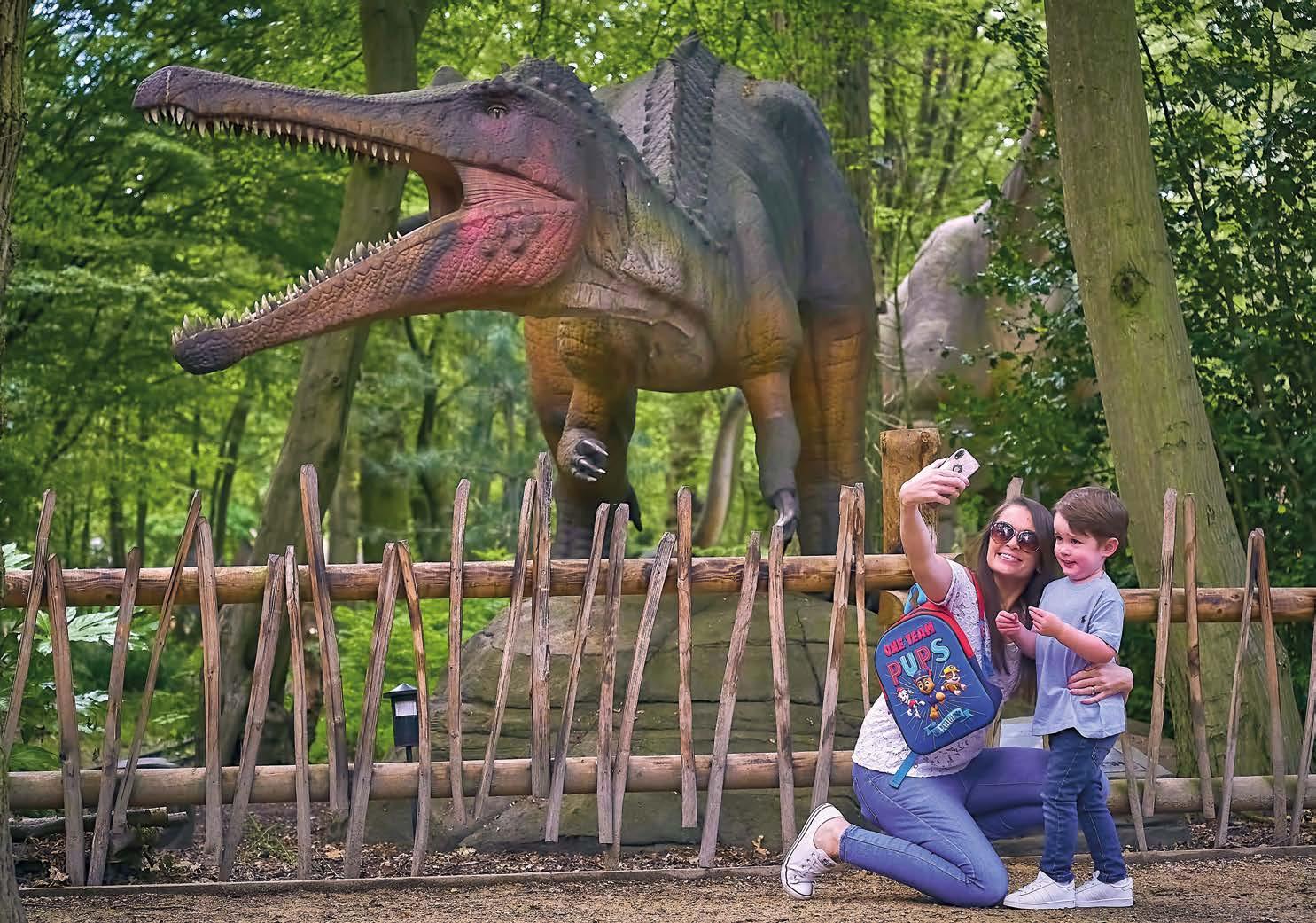


The Grove
Like most tourism businesses, The Grove is looking forward to a full reopening of its facilities this summer.
This stunning venue certainly has a lot to offer both private individuals and business customers. Set in 300 acres of stunning Hertfordshire countryside, The Grove is the ultimate five-star retreat. Lovingly restored, the former home of the Earls of Clarendon is situated just 18 miles from London, and is home to an award-winning spa, championship golf course and mouthwatering restaurants. As the UK opens up again, the management team at the hotel has more reason than most to be optimistic. Bernard Murphy, group managing director of Ralph Trustees – the firm that owns The Grove – says: “Our business comes mainly from domestic customers, rather than people coming in from overseas. Although the UK lockdown is gradually being lifted, there’s less chance of people being allowed to go on overseas holidays this year due to concerns about bringing a new COVID variant back to the UK. This means that more people will be looking to take vacations in the UK, which potentially could result in more business for us. “This translates to the business customer, too. Many international conferences in Europe have been postponed so rather than looking at Paris or Barcelona, companies may choose to host their conferences in the UK instead. This would be a huge positive for us.” The Grove’s business customer base is vast, ranging from local companies that want top-class facilities to host a meeting or conference, to football clubs that need a base to stay the night before a match in the capital. The Grove has also been the location for several film productions, with media firms attracted by the venue’s vast spaces and picturesque surroundings. “Going into 2020 we were on track to have our best year ever,” he recalls. “During the last few months a major refurbishment has taken place of all the bedrooms in the hotel and our public spaces and areas have also been refurbished. So with a new product in place, numerous additional leisure pursuits, along with two new restaurant concepts we are very excited to be opening again.” “We have carried out a staff training programme to ensure we continue to provide a top-class service. I am confident that this summer will be much better than the last one.”

Hanbury Manor
Hanbury Manor Marriott Hotel & Country Club is a Jacobean-style manor house set in 200 acres of beautiful countryside in Ware, Hertfordshire.
An ideal setting for weddings and private celebrations, the venue also has a lot to offer the discerning business customer. It has launched the Marriott Bonvoy Business Ready programme to help small to mediumsized enterprises (SMEs) efficiently book business travel across multiple destinations at trusted hotel brands with preferential rates. The idea is to take away the hassle and risk of booking business travel, with benefits including an 8% discount on standard rates, upgraded WIFI access, room upgrades and a sign-on bonus of 2,500 points for the first paid stay (new members only). In addition, for those business guests who have found themselves working from home for the last year, Hanbury Manor has also introduced Marriott Bonvoy’s Day Pass. This new initiative has been developed to help with some of the daily challenges of working from home instead of an office or work environment, such as day-to-day monotony, not having a dedicated workspace
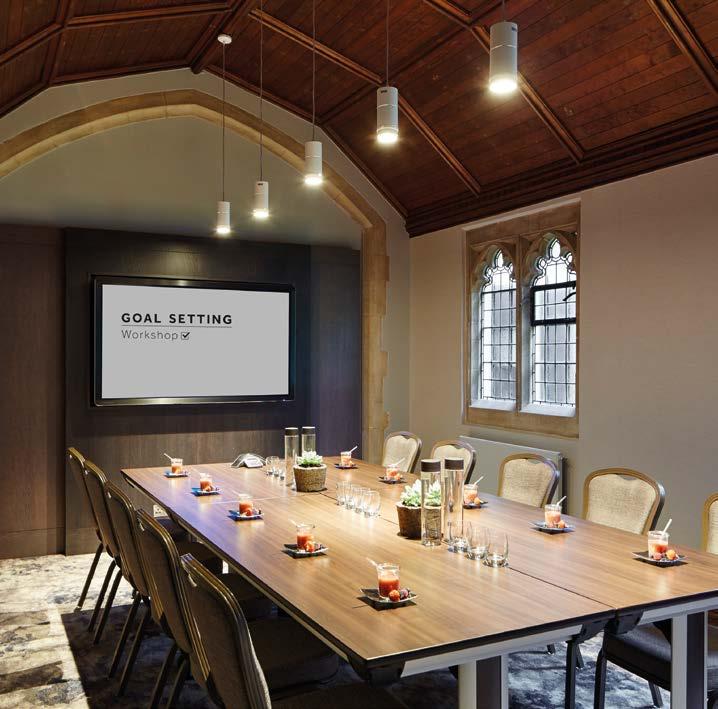

environment, no boundary between work and personal life (especially for families), and WiFi issues. Alison Morton, director of sales and marketing at Hanbury Manor, says: “I’m sure that when the current restrictions lift, we’ll see this option being very popular with people locally. Many people are keen for a change of scene having been stuck at home since before Christmas and longer in some cases.” COVID-19 continues to have a significant impact on the travel and hospitality sector around the globe. With ongoing travel restrictions and the impact of government measures, it’s clear that it will take some time for business to return to pre-pandemic levels. However, with the vaccine roll-out in full swing and infection rates falling rapidly, Alison is looking to the future with optimism.
Hanbury Manor
She says: “One important factor we must never forget is the power of travel. Despite what the world throws at us, the joy we all feel from exploring new destinations, experiencing new cultures or simply travelling to meet our loved ones for lunch or a round of golf will never diminish. Following the government announcement about the UK roadmap, we saw our booking activity across the UK surge, which was wonderful to see and demonstrates that people are keen to travel again. “As we emerge from this crisis, it’s clear that the leisure market will be the first to recover. After almost a year of restrictions, people are itching to travel again. As restrictions lift and people’s confidence to travel returns, we anticipate that at this hotel we’ll see weekend staycation business returning quickly. “From a business travel and conference and meetings perspective, we see the recovery coming at a slower pace. While the pandemic has sparked the rise of video calls and webinars, it can never replace the need for face-to-face contact. People crave connections and collaborate better when they’re together. Over the next few months, we anticipate that we’ll see business travel resume steadily, but we’ll also see the evolution of business travel with hybrid events, where elements of the event take place in person and others take place digitally. Our team here is prepared to adapt and embrace these changes.” “Despite what the world throws at us, the joy we all feel from exploring new destinations, experiencing new cultures or simply travelling to meet our loved ones for lunch or a round of golf will never diminish.”
Sopwell House
Sopwell House is also looking to the future with renewed optimism. Nestled within 12 acres of idyllic Hertfordshire countryside, it’s perfectly placed to host a conference, meeting or event of any size.
Rafi Bejerano, director at Sopwell House owner AB Hotels, says: “We take a very customerfocused approach, and as a family-run business it’s our ethos to treat every meeting, event, wedding and private celebration like a family gathering. Our experienced team possesses a passion to deliver warm and faultless service to every guest, with attention to detail and genuine hospitality at the heart of everything we do. Whether you’re looking to host a large conference or small meeting, a teambuilding activity away day or a peaceful relaxing treat for your staff, Sopwell House can cater for your every need.” Over the past 12 months, Rafi and his team have been working hard behind the scenes to create an environment that is safe and socially distanced, whilst maintaining the venue’s luxury offering, warm friendly service, fantastic team spirit and individual endeavour for genuine hospitality. The team has also engaged with health and safety specialists and governing bodies along the way to ensure that the fine balance of safety and service is achieved.
Rafi says: “Enhanced cleaning and sanitisation of high traffic and touch points will continue to happen as it did when we came out of the first lockdown last summer, along with daily temperature checks for all clients and staff members. One positive is that this prolonged lockdown has given us the chance to look at the small things that need repairing, touching up or improving – something that would have been impossible to do had the hotel been open and operating normally. “Going forwards, the biggest challenge will be hosting meetings and events safely. Social events and celebrations such as weddings are already looking promising with customers wanting to make up for lost time, but I think it will take a little time for large conferences and events to return. A lot of companies have got used to satellite meetings over the last year, and whilst many are keen to get the whole team back together under one roof to plan their own roadmaps out of COVID, there’s still some uncertainty about large groups getting together. “As a hotel, we need to have confidence in what we do. We’ve successfully held meetings and events for many years, and whilst COVID has impacted this severely over the past 12 months, it’s now time to take advantage of all those years of experience and guide others through the latest new normal.”
Aubrey Park Hotel

The optimism of the management team at Aubrey Park can be felt by simply looking at the venue’s website.
On the home page, a statement reads: “We are excited to announce we will be re-opening our doors on Monday May 17, 2021 to all of our guests for leisure breaks. We cannot wait to see you soon!”
Sopwell House
The venue’s terrace has already been open since April 17 for customers to enjoy an al-fresco dining experience over lunch or afternoon tea. Rafael Gonzalez, managing director of Aubrey Park, says: “We’re ready to go. Our priority has always been the safety and wellbeing of our guests, colleagues and their families and we continue to strive to offer anybody who stays with us a safe place that feels like home during these difficult times. “We have several exciting promotions for corporate customers throughout the year. For example, you can book your meeting or conference on a Friday, Saturday, Sunday or Monday and one in every ten delegates get in for free. Whether you’re in need of a larger conference space, boardroom or a venue for your next teambuilding day, we can accommodate you in one of our nine flexible meeting spaces. We can also cater for hybrid meetings, where some people are present at our venue and others dial in remotely.” Aubrey Park is one of Hertfordshire’s hidden havens. Sitting peacefully between the historic city of St Albans and the old town of Hemel Hempstead, this exclusive venue combines style and elegance with a commitment to providing top-notch customer service. Rafael joined the venue two years ago and after a good start, the last twelve months have been tough for obvious reasons. “The biggest challenge was the stop-go nature of the last year,” he says. “We were open, then closed, the open and closed again. It has hardly helped us as we try to build momentum. I’m confident that the worst is behind us now, though, and let’s hope and pray that this lockdown will be the last.”


Toyin Opebiyi, Owner, Tees Bakery
Helping your business bounce back
The Volunteer Business Support Scheme (VBSS) is a free and confidential 1-2-1 mentoring programme for micro, small and medium sized businesses in Hertfordshire. The scheme is delivered by Hertfordshire Growth Hub, powered by Hertfordshire Local Enterprise Partnership (LEP), in partnership with the University of Hertfordshire, and was launched in June 2020 as part of Hertfordshire LEP’s £3.28m COVID-19 business support package.
Since then, our network of mentors has supported more than 190 businesses, providing over 600 hours of 1-2-1 support. The scheme has been extended until November 2021 to help even more businesses. If you’re struggling during this uncertain time or would simply benefit from having a critical friend, mentor and coach to talk to and explore new ideas with, our 1-2-1 sessions would be an ideal starting point.
By joining the scheme, you’ll benefit from: • Up to 12 hours of free and confidential support from a highly experienced mentor • Being matched to a mentor that has experience within your sector or the specific situation you are facing • Signposting to support packages that are available locally, regionally and nationally • Support that’s completely flexible to your needs • Access to all the resources and support available through the Growth Hub and partners
Toyin Opebiyi, owner of luxury cake company Tees Bakery, has benefitted greatly from the scheme. At the start of the pandemic, her business was hugely affected. “My clients began to postpone their weddings, and as things became more uncertain, the cancellations started to come through”, explained Toyin. Money stopped coming in, and deposits had to be refunded, causing a great deal of emotional distress. Toyin was balancing running her business with home-schooling and missed the deadline for the Government’s discretionary grant, which led to her calling Hertfordshire County Council to ask for help. She was told about VBSS so signed up immediately. Toyin was matched with volunteer mentor Chris Riley, a retired accountant with over 30 years of experience. “Meeting Chris was an absolute delight. He had experience in my sector and understood exactly what I was going through.” Toyin liked the structured and prepared approach Chris took to each video call. “We always finished with action points, which kept me on my toes. Chris was giving up his time to help my business and it motivated me to keep going.” They explored different ways to pivot the business, resulting in Toyin expanding her offer into an online cake shop and the business flourishing again.
Visit hertsgrowthhub.com and register for free to find out more. You’ll gain immediate access to a host of benefits, including our online Marketplace where you’ll find our VBSS funded listing.
THE PEER NETWORKS PROGRAMME
The national Peer Networks programme brings together SME leaders who, with the guidance of experienced facilitators, collaborate to overcome existing challenges, recognise and act on new opportunities, and find ways to improve business productivity.
The programme is delivered locally by the county’s flagship business support provider Hertfordshire Growth Hub, powered by Hertfordshire LEP, in partnership with Hertfordshire Chamber of Commerce. Over the 2020/21 financial year, the programme has supported 110 Hertfordshire businesses, enabling them
As part of the Peer Networking programme, I had several 121 support sessions with the group’s facilitator, Noshir Desai. It was a privilege to share my business ambitions and challenges with a pair of interested and independent ears. And the gentle wisdom reflected in the responding voice was insightful and instructive. The ‘listen, question and suggest’ approach adopted by Noshir was welcome and refreshing, and I grew to appreciate his genuine interest in me gaining benefit from the 121 and group sessions run by the programme.
Martin Gladdish, Business Ghost
The P2P sessions have been immensely valuable as I have learned from others in the group, and it has enabled me to focus on key areas within the business. The process of sharing an issue makes it smaller and the breadth of experience in the group means many different perspectives are bought to bear on the issue. Highly recommended. to build trusted local support networks, receive 1-2-1 tailored guidance, and access further support from Hertfordshire Growth Hub where needed. With Peer Networks set to continue in 2021/22 and the next cohort of peer groups commencing this summer, those interested in taking part are invited to register with the Growth Hub at
www.hertsgrowthhub.com

A COVID-SECURE ALTERNATIVE TO THE HOME OFFICE

With more of us working from home on a regular basis, HatTech Business Centre in Hatfield offers a modern, Covidsecure alternative to the home office combined with a unique opportunity to find inspiration among like-minded professionals.
Designed to accommodate lone workers, entrepreneurs and SMEs, HatTech provides a variety of business operating possibilities from flexible or reserved workstations within our co-working suite, private office accommodation, virtual office services and meeting room facilities.

The bright, airy co-working suite is laid out to ensure social distancing can be comfortably observed, with enhanced cleaning, hand sanitiser stations throughout, and visual reminders of the safety guidelines. Our flexible co-working membership scheme offers six different tiers, ranging from a day rate, five or ten days per month and three unlimited membership options. HatTech’s high quality, adaptable workspaces and our friendly, knowledgeable team mean you can be confident your business will be supported as the Government’s Covid-19 guidelines change and restrictions are lifted. Meet and greet your clients, or just enjoy some time away from your desk in our Business Lounge – a fresh, modern space where you can eat your lunch, have a coffee from the Collaboration Bar or hold your informal meeting in a more relaxed environment. The centre’s prime location provides excellent rail and road links with easy access to both London and Cambridge. The A1(M) is a five-minute drive and Hatfield train station is a two-minute walk from HatTech.
A range of cost-effective private offices are ideal for start-ups and small businesses looking to make the next step.
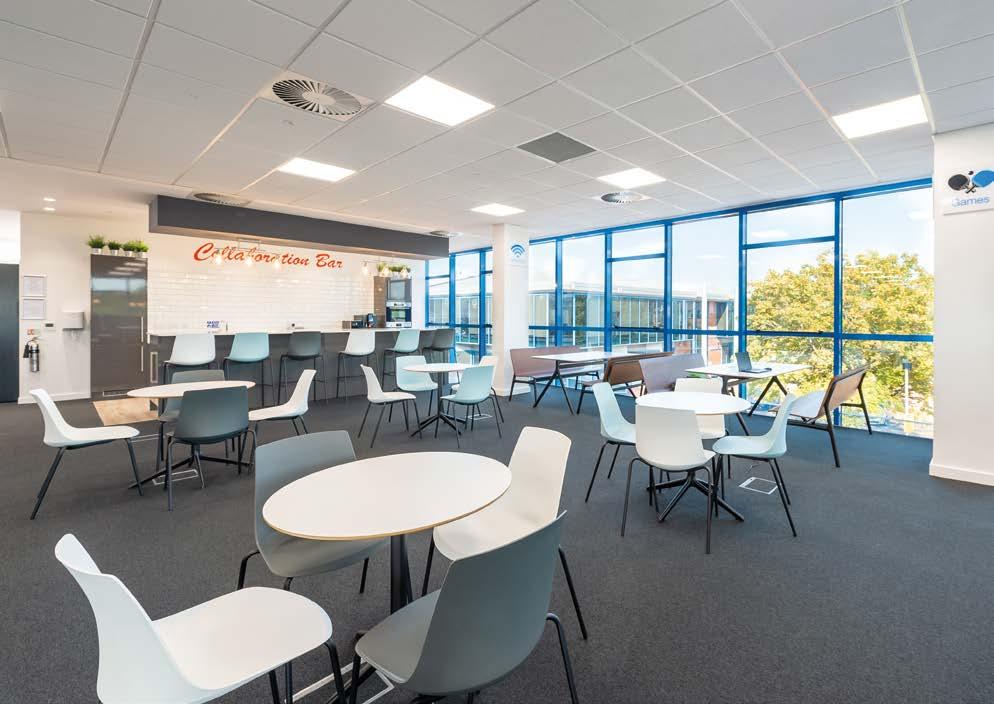
Table tennis and a foosball table have been provided to encourage networking opportunities, or simply for your relaxation and pleasure. Those needing a ‘digital detox’ during their day can enjoy the tranquillity of HatTech’s Wellbeing Garden. This purpose-designed creative business hub in Beaconsfield Road, Hatfield has been built with help from a £751k Local Growth Fund grant from Hertfordshire Local Enterprise Partnership (LEP).
To discuss any of our services call our team on 01707 623623 or email enquiries@hattech.org.uk – we’d love to hear from you! For further information see www.hattech.org.uk
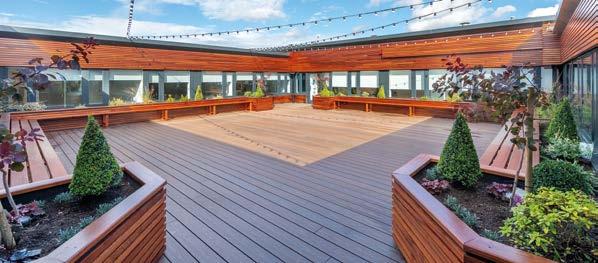
COVID SECURE

A MODERN, CREATIVE ENVIRONMENT. RIGHT ON YOUR DOORSTEP.
Spacious co-working suite Business lounge High-speed WiFi Wellbeing garden Flexible membership tiers
Find inspiration alongside like-minded professionals in HatTech’s bright, modern, Covid-secure co-working suite. Our flexible membership tiers give you the freedom to adapt as your business requirements change.
Supporting you to work safely.
ENVIRONMENT TOP TIPS Remember your reusables! The UK throws away 2.5 billion disposable coffee cups every year. Stop single-use. Remember your reusables! The UK throws away 2.5 billion disposable coffee cups every year. Stop single-use. There are lots of ways you can reduce your organisation’s waste. Our top tips are: 1. For events, consider a magnetic / pin badge or lanyard rather than branded goods, as these are easier to replace if a name/ logo changes. 2. Buy work related apparel from ethical / sustainable brands. The premium paid often also means better quality, so they last longer and you need to buy less. Ethical Consumer has a list of how suppliers measure up. Reuse: 3. For businesses, reducing the clothing footprint could be as simple as washing and reusing uniforms after someone has left. Did you know that extending the average lifespan of clothes by just 3 months of active use would lead to a 5-10% reduction in carbon, waste and water footprints! 4. Consider hosting a clothes swap for staff (or clients). It is a fun way to extend the life of clothing by swapping with others. The average person only wears two thirds of what’s in their wardrobe. WasteAware can offer you rails and hangers for free to get you started. Fashion Revolution Week is 20-26 April 2020. Join in to make it the largest swap in history. For details contact WasteAware@hertfordshire.gov.uk 5. Use a guppy bag when washing to catch microfi bers shed during the process and stop them entering the watercourse. Recycle: Remember your reusables! The UK throws away 2.5 billion disposable coffee cups every year. Stop single-use. Remember your reusables! The UK throws away 2.5 billion disposable coffee cups every year. Stop single-use. Remember your reusables! The UK throws away 2.5 billion disposable coffee cups every year. Stop single-use. Remember your reusables! The UK throws away 2.5 billion disposable coffee cups every year. Stop single-use. Remember your reusables! The UK throws away 2.5 billion disposable coffee cups every year. Stop single-use. e carbon benefi t hidden in our clothing For a business wanting to reduce their carbon footprint, textiles may seem an odd place to focus. We generally hear about the three big areas that affect climate change – energy, transport and food. However, the textiles industry is responsible for 10% of global carbon emissions. This means the clothes that we buy contributes to climate change more than air and sea travel combined. From growing and harvesting the raw material, to how they’re made, to crossing the world to get from factory to store, to the impact of washing them and how they’re disposed of, each item of clothing produced has a lifecycle carbon impact across the whole of a product’s life (the ‘cradle to grave’ impact). This is measured using kilograms of CO2 eq (or carbon dioxide equivalent), a standard unit for measuring carbon footprints. What has been found is a shocking amount of emissions and waste from both the production and disposal stage. Fast fashion is making clothing more disposable, with cheaper prices and less durable garments, meant to last out the season rather than years. This accelerates carbon emissions, causes increased global warming and sees more textile waste in landfi lls. The fashion industry is now taking steps to move towards a more ethical and environmentally friendly supply chain and production methods, but it won’t change overnight. We need to play our Why is this relevant to your business? We might be familiar with greener products and services – but looking inwards to the resources used is another angle to consider. Changing to more environmentally-friendly business practices will save you money and provide a stronger selling proposition when pitching your goods and services to your target audience. Why become more sustainable? Research shows that once consumers want to be associated with environmental or ethical products. A recent survey conducted by AYTM found that 71% of millennials are more likely to support an environmentally-friendly business. Likewise, 86% of customers say they prefer to shop at businesses that recycle, 74% prefer companies that limit the use of pollutants and unnecessary chemicals and 67% of shoppers prefer companies that support renewable energy. There is also evidence that many consumers want guidance on how their individual actions can help make a difference. Businesses are well-placed to help raise consumer awareness and understanding and, more importantly, change the way they consume. For example, did you know that every year, Hertfordshire residents throw over 7000 tonnes of textiles into their rubbish bins, when they could have been reused, repaired or recycled. Here at WasteAware, keeping textiles out the bin is a campaign we are actively championing. It is a three-pronged approach which you can easily adopt in your business and at home: Hertfordshire is leading the way to a greener, better future for businesses… but what can your business do? ENVIRONMENT TOP TIPS Remember your reusables! The UK throws away 2.5 billion disposable coffee cups every year. Stop single-use. Remember your reusables! The UK throws away 2.5 billion disposable coffee cups every year. Stop single-use. There are lots of ways you can reduce your organisation’s waste. Our top tips are: 1. For events, consider a magnetic / pin badge or lanyard rather than branded goods, as these are easier to replace if a name/ logo changes. 2. Buy work related apparel from ethical / sustainable brands. The premium paid often also means better quality, so they last longer and you need to buy less. Ethical Consumer has a list of how suppliers measure up. Reuse: 3. For businesses, reducing the clothing footprint could be as simple as washing and reusing uniforms after someone has left. Did you know that extending the average lifespan of clothes by just 3 months of active use would lead to a 5-10% reduction in carbon, waste and water footprints! 4. Consider hosting a clothes swap for staff (or clients). It is a fun way to extend the life of clothing by swapping with others. The average person only wears two thirds of what’s in their wardrobe. WasteAware can offer you rails and hangers for free to get you started. Fashion Revolution Week is 20-26 April 2020. Join in to make it the largest swap in history. For details contact WasteAware@hertfordshire.gov.uk 5. Use a guppy bag when washing to catch microfi bers shed during the process and stop them entering the watercourse. Remember your reusables! The UK throws away 2.5 billion disposable coffee cups every year. Stop single-use. Remember your reusables! The UK throws away 2.5 billion disposable coffee cups every year. Stop single-use. Remember your reusables! The UK throws away 2.5 billion disposable coffee cups every year. Stop single-use. Remember your reusables! The UK throws away 2.5 billion disposable coffee cups every year. Stop single-use. Remember your reusables! The UK throws away 2.5 billion disposable coffee cups every year. Stop single-use. e carbon benefi t hidden in our clothing For a business wanting to reduce their carbon footprint, textiles may seem an odd place to focus. We generally hear about the three big areas that affect climate change – energy, transport and food. However, the textiles industry is responsible for 10% of global carbon emissions. This means the clothes that we buy contributes to climate change more than air and sea travel combined. From growing and harvesting the raw material, to how they’re made, to crossing the world to get from factory to store, to the impact of washing them and how they’re disposed of, each item of clothing produced has a lifecycle carbon impact across the whole of a product’s life (the ‘cradle to grave’ impact). This is measured using kilograms of CO2 eq (or carbon dioxide equivalent), a standard unit for measuring carbon footprints. What has been found is a shocking amount of emissions and waste from both the production and disposal stage. Fast fashion is making clothing more disposable, with cheaper prices and less durable garments, meant to last out the season rather than years. This accelerates carbon emissions, causes increased global warming and sees more textile waste in landfi lls. The fashion industry is now taking steps to move towards a more ethical and environmentally friendly supply chain Why is this relevant to your business? We might be familiar with greener products and services – but looking inwards to the resources used is another angle to consider. Changing to more environmentally-friendly business practices will save you money and provide a stronger selling proposition when pitching your goods and services to your target audience. Why become more sustainable? Research shows that once consumers want to be associated with environmental or ethical products. A recent survey conducted by AYTM found that 71% of millennials are more likely to support an environmentally-friendly business. Likewise, 86% of customers say they prefer to shop at businesses that recycle, 74% prefer companies that limit the use of pollutants and unnecessary chemicals and 67% of shoppers prefer companies that support renewable energy. There is also evidence that many consumers want guidance on how their individual actions can help make a difference. Businesses are well-placed to help raise consumer awareness and understanding and, more importantly, change the way they consume. For example, did you know that every year, Hertfordshire residents throw over 7000 tonnes of textiles into their rubbish bins, when they could have been reused, repaired or recycled. Here at WasteAware, keeping textiles out the bin is a campaign we are actively championing. It is a three-pronged ENVIRONMENT TOP TIPS landowners, farmers, and other organisations to ensure that sustainability remains a key priority. Social media campaigns and a residents’ survey are all helping to encourage people to lead more sustainable lives. Businesses can access help, including green grants, advice on reducing their carbon footprint and how to take sustainability actions by visiting https://hertsgrowthhub.com/. Meanwhile under the Sustainable Hertfordshire initiative the County Council is Leading by Example in its own operations. For example, the Council recently secured Government funds to help reduce carbon emissions from public buildings including hospitals, schools and council buildings by funding low carbon heating systems, such as heat pumps, and energy efficiency measures like insulation and LED lighting. These initiatives will be a test bed demonstration of practical measures on a significant scale while at the same time creating opportunities for local construction and manufacturing sectors. Finally, in recognition of the UK hosting the UN Climate Change Conference 2021 (COP26), in Glasgow this November, Hertfordshire is planning its own climate summit https://www.hertfordshire.gov.uk/aboutthe-council/news/news-archive/un-climatechange-conference-2021. Hertfordshire COP26 will be a virtual event with some live local activity across the county, spanning several days (1-5 November) to demonstrate how climate change is affecting Hertfordshire and how we are all working together in our race to zero. As you would expect, Hertfordshire County Council is taking action to tackle the climate crisis. The Sustainable Hertfordshire Strategy and Action Plan at www.hertfordshire. gov.uk/sustainablehertfordshire sets out a route-map for Hertfordshire to become carbon neutral by 2030 by reducing emissions while at the same time improving the quality of life for residents and their local environment. But what is the role of business in helping to achieve a Sustainable Hertfordshire and is it affordable? Businesses are often surprised by the actual cost savings made by taking environmental action along with the less tangible benefits of staff engagement and talent retention. What’s more, not only is taking sustainability action the right thing to do, it can also result in competitive advantage. Increasingly, businesses want to demonstrate to customers and clients their commitment to Net Zero goals. And new ways of thinking on how to do things differently, cleaner and greener, can lead to product and process innovation and growth opportunities. Here are some Top Tips: 1 Start simple… focus on reducing waste Check recent Inspire Environment Top Tips (Jan/Feb 2021 issue) for simple guides to get your business prepared for recycling more of your business waste as required under new Government regulations from 2023. There will be new obligations for those who manufacture and sell packaging materials, and these are covered in the recent Inspire articles as well (Nov/Dec 2020 issue). 3 Crowd source ideas from staff From CEO to intern, consult and involve staff regularly to reinforce behaviours and get further ideas on reducing waste, recycling more and saving energy. 4 Measure Environmental Impacts The UK Government has published https://www.gov.uk/guidance/measuringand-reporting-environmental-impactsguidance-for-businesses aimed principally at UK quoted companies obliged to report on their greenhouse gas emissions as part of their annual Directors’ Report. This obligation does not apply to smaller businesses. However, a simple approach for small companies would simply be to study metered energy and water use, inventory and waste and to set targets using SMART principles to reduce them over time. 5 Consider How to Re-invest any savings If costs savings result from closer attention to resource consumption and waste, then consider ring-fencing the savings to invest in improving green performance further. ENVIRONMENT TOP TIPS Remember your reusables! The UK throws away 2.5 billion disposable coffee cups every year. Stop single-use. Remember your reusables! The UK throws away 2.5 billion disposable coffee cups every year. Stop single-use. There are lots of ways you can reduce your organisation’s waste. Our top tips are: 1. For events, consider a magnetic / pin badge or lanyard rather than branded goods, as these are easier to replace if a name/ logo changes. 2. Buy work related apparel from ethical / sustainable brands. The premium paid often also means better quality, so they last longer and you need to buy less. Ethical Consumer has a list of how suppliers measure up. Reuse: 3. For businesses, reducing the clothing footprint could be as simple as washing and reusing uniforms after someone has left. Did you know that extending the average lifespan of clothes by just 3 months of active use would lead to a 5-10% reduction in carbon, waste and water footprints! 4. Consider hosting a clothes swap for staff (or clients). It is a fun way to extend the life of clothing by swapping with others. The average person only wears two thirds of what’s in their wardrobe. WasteAware can offer you rails and hangers for free to get you started. Fashion Revolution Week is 20-26 April 2020. Join in to make it the largest swap in history. For details contact WasteAware@hertfordshire.gov.uk 5. Use a guppy bag when washing to catch microfi bers shed during the process and stop them entering the watercourse. Remember your reusables! The UK throws away 2.5 billion disposable coffee cups every year. Stop single-use. Remember your reusables! The UK throws away 2.5 billion disposable coffee cups every year. Stop single-use. Remember your reusables! The UK throws away 2.5 billion disposable coffee cups every year. Stop single-use. Remember your reusables! The UK throws away 2.5 billion disposable coffee cups every year. Stop single-use. Remember your reusables! The UK throws away 2.5 billion disposable coffee cups every year. Stop single-use. e carbon benefi t hidden in our clothing For a business wanting to reduce their carbon footprint, textiles may generally hear about the three big carbon emissions. This means the clothes that we buy contributes to climate change more than air and material, to how they’re made, to crossing the world to get from factory to store, to the disposed of, each item of clothing produced whole of a product’s life (the ‘cradle to grave’ impact). This is measured using kilograms of CO2 eq (or carbon dioxide equivalent), a standard unit for measuring carbon footprints. What has been found is a shocking amount production and disposal stage. Fast fashion is making clothing more disposable, with cheaper prices and less durable garments, meant to last out the season rather than years. This accelerates carbon emissions, causes increased global warming and sees The fashion industry is now taking steps Why is this relevant to your business? We might be familiar with greener products and services – but looking inwards to the resources used is another angle to consider. Changing to more environmentally-friendly business practices will save you money and provide a stronger selling proposition when pitching your goods and services to your target audience. Why become more sustainable? Research shows that once consumers want to be associated with environmental or ethical products. A recent survey conducted by AYTM found that 71% of millennials are more likely to support an environmentally-friendly business. Likewise, 86% of customers say they prefer to shop at businesses that recycle, 74% prefer companies that limit the use of pollutants and unnecessary chemicals and 67% of shoppers prefer companies that support renewable energy. There is also evidence that many consumers want guidance on how their individual actions can help make a difference. Businesses are well-placed to help raise consumer awareness and understanding and, more importantly, change the way they consume. For example, did you know that every year, Hertfordshire residents throw over 7000 tonnes of textiles into their rubbish bins, when they could have been reused, repaired or recycled. Here at WasteAware, keeping textiles out the bin is a campaign we are actively championing. It is a three-pronged wasteaware.org.uk/reusables WasteAwarePartnership HertsWasteAware HertsWasteAware #RememberYourReusables: wasteaware.org.uk/reusables #RememberYourReusables: 6. When you are ready to part with a garment, see if you can donate it to a charity rather than send it to landfi ll. For those that can’t be used again by you, look into http://www.uniformreuse.co.uk/ Remember, any small effort against the fast fashion trends makes a positive impact on the environment! For more see www.wasteaware.org.uk/textiles wasteaware.org.uk/reusables WasteAwarePartnership HertsWasteAware HertsWasteAware #RememberYourReusables: wasteaware.org.uk/reusables WasteAwarePartnership #RememberYourReusables: wasteaware.org.uk/reusables WasteAwarePartnership HertsWasteAware HertsWasteAware #RememberYourReusables: wasteaware.org.uk/reusables WasteAwarePartnership HertsWasteAware #RememberYourReusables: wasteaware.org.uk/reusables #RememberYourReusables: part in changing the use and consumption of clothing too. WRAP (the Waste and Resources Action Programme) estimates that in the UK alone, we consume around 1.7m tonnes of textiles annually, and of this more than 600,000 tonnes are sent to landfi ll or incinerated. • Preventing the purchase of new clothes (reduce) • Keeping clothing in active use for longer (reuse) • Recycling unwearable textiles (recycle) https://www.rapidformations.co.uk/blog/how-can-your-business-reduce-its-carbon-footprint/ https://www.ecotricity.co.uk/news/news-archive/2018/the-carbon-footprint-of-getting-dressed https://www.trustedclothes.com/blog/2016/02/23/fast-fashion-and-your-carbon-footprin/ When you are ready to part with a garment, Keep in touch Sign up to our monthly e-bulletin https://www.hertfordshire.gov.uk/updateme/ wasteaware.org.uk/reusables WasteAwarePartnership HertsWasteAware #RememberYourReusables: #RememberYourReusables: Recycle: 6. When you are ready to part with a garment, see if you can donate it to a charity rather than send it to landfi ll. For those that can’t be used again by you, look into http://www.uniformreuse.co.uk/ Remember, any small effort against the fast fashion trends makes a positive impact on the environment! For more see www.wasteaware.org.uk/textiles wasteaware.org.uk/reusables WasteAwarePartnership HertsWasteAware #RememberYourReusables: wasteaware.org.uk/reusables #RememberYourReusables: wasteaware.org.uk/reusables WasteAwarePartnership HertsWasteAware #RememberYourReusables: wasteaware.org.uk/reusables WasteAwarePartnership #RememberYourReusables: #RememberYourReusables: and production methods, but it won’t change overnight. We need to play our part in changing the use and consumption of clothing too. WRAP (the Waste and Resources Action Programme) estimates that in the UK alone, we consume around 1.7m tonnes of textiles annually, and of this more than 600,000 tonnes are sent to landfi ll or incinerated. approach which you can easily adopt in your business and at home: • Preventing the purchase of new clothes (reduce) • Keeping clothing in active use for longer (reuse) • Recycling unwearable textiles (recycle) https://www.rapidformations.co.uk/blog/how-can-your-business-reduce-its-carbon-footprint/ https://www.ecotricity.co.uk/news/news-archive/2018/the-carbon-footprint-of-getting-dressed https://www.trustedclothes.com/blog/2016/02/23/fast-fashion-and-your-carbon-footprin/ When you are ready to part with a garment, 2 … and don’t forget to turn out the lights There are many helpful checklists online, prepared by price comparison sites which summarise the key easy-to-take steps many businesses can take to reduce unsustainable energy usage – mainly by simply switching lights and electronic equipment off when not in use. 6 Get help and ideas from the County Council’s Sustainable Hertfordshire Initiative Working in tandem with Hertfordshire Local Enterprise Partnership, the county council is supporting businesses as they transition to meet the UK’s net zero targets. The county council is actively engaging with local businesses, wasteaware.org.uk/reusables WasteAwarePartnership HertsWasteAware #RememberYourReusables: Recycle: 6. When you are ready to part with a garment, see if you can donate it to a charity rather than send it to landfi ll. For those that can’t be used again by you, look into http://www.uniformreuse.co.uk/ Remember, any small effort against the fast fashion trends makes a positive impact on the environment! For more see www.wasteaware.org.uk/textiles wasteaware.org.uk/reusables WasteAwarePartnership HertsWasteAware #RememberYourReusables: wasteaware.org.uk/reusables #RememberYourReusables: wasteaware.org.uk/reusables WasteAwarePartnership HertsWasteAware #RememberYourReusables: wasteaware.org.uk/reusables WasteAwarePartnership #RememberYourReusables: part in changing the use and consumption Resources Action Programme) estimates that in the UK alone, we consume around this more than 600,000 tonnes are sent to approach which you can easily adopt in your business and at home: • Preventing the purchase of new clothes (reduce) • Keeping clothing in active use for longer (reuse) • Recycling unwearable textiles (recycle) https://www.rapidformations.co.uk/blog/how-can-your-business-reduce-its-carbon-footprint/ https://www.ecotricity.co.uk/news/news-archive/2018/the-carbon-footprint-of-getting-dressed https://www.trustedclothes.com/blog/2016/02/23/fast-fashion-and-your-carbon-footprin/ When you are ready to part with a garment, www.hertfordshire.gov.uk/sustainablehertfordshire
WasteAwarePartnership HertsWasteAwareHertsWasteAwareWasteAwarePartnershipHertsWasteAwarewasteaware.org.uk/reusables HertsWasteAwareWasteAwarePartnershipHertsWasteAwareHertsWasteAwarewasteaware.org.uk/reusables @hertsccHertsWasteAwarewasteaware.org.uk/reusables HertsWasteAwareWasteAwarePartnershipHertsWasteAwareHertsWasteAwarewasteaware.org.uk/reusables @hertscountycouncil HertsWasteAware HertsWasteAwareWasteAwarePartnership WasteAwarePartnershipHertsWasteAwareHertsWasteAware HertsWasteAwareHertsWasteAwareHertsWasteAware 44 INSPIRE HertsWasteAware HertsWasteAwareHertsWasteAware HertsWasteAwareHertsWasteAware HertsWasteAware

